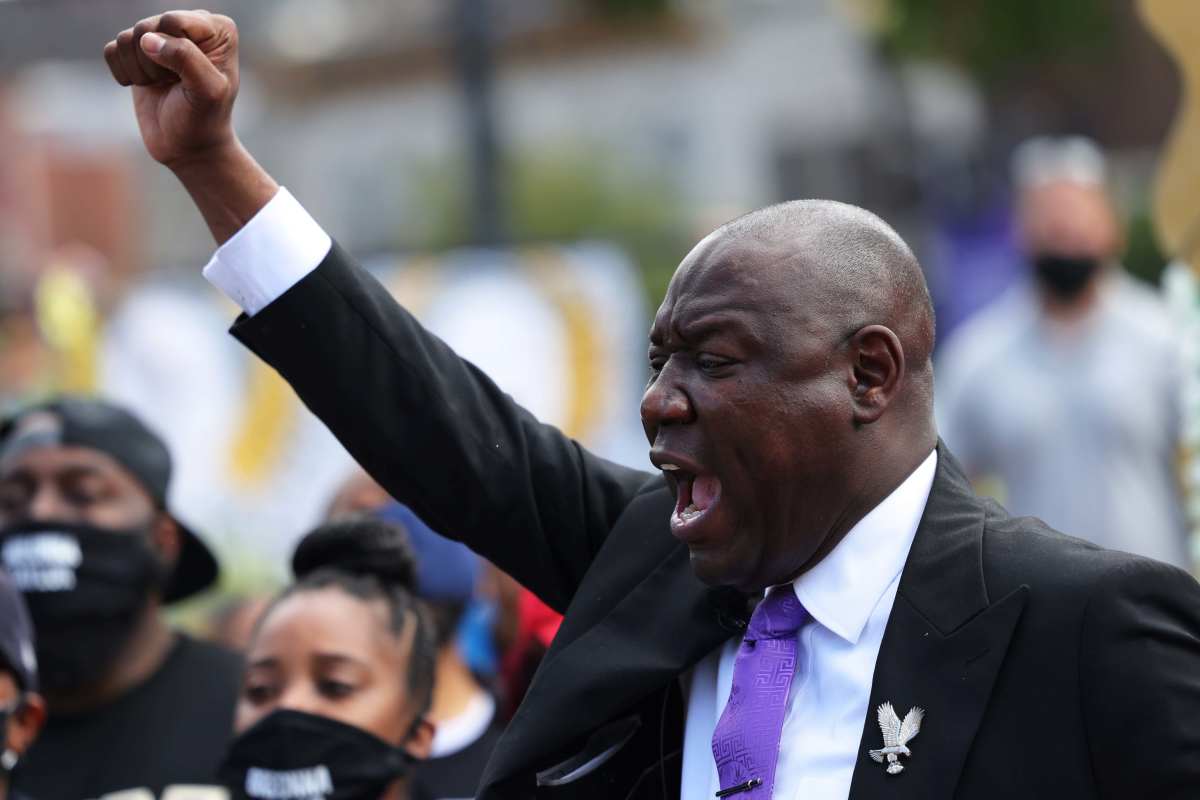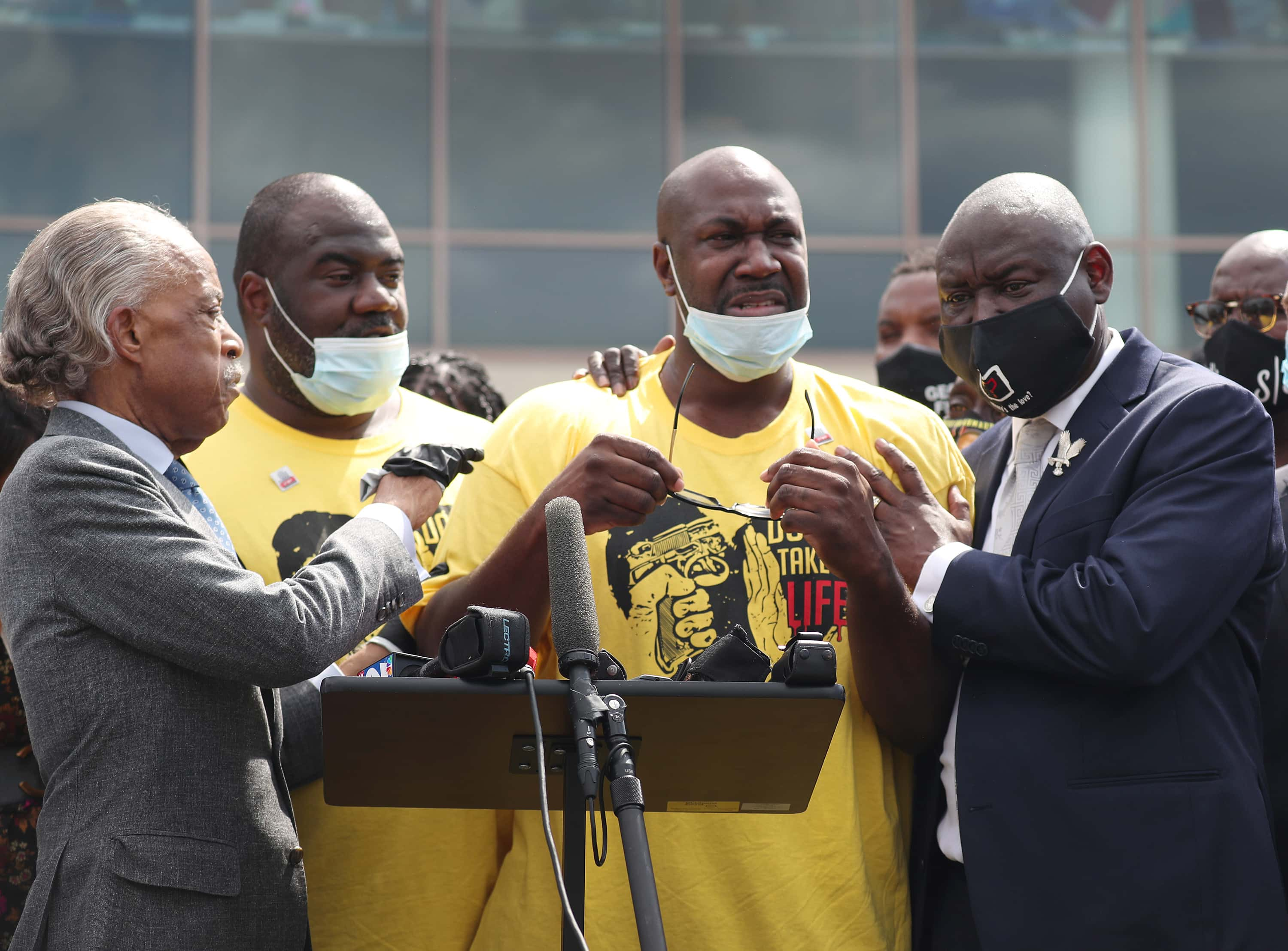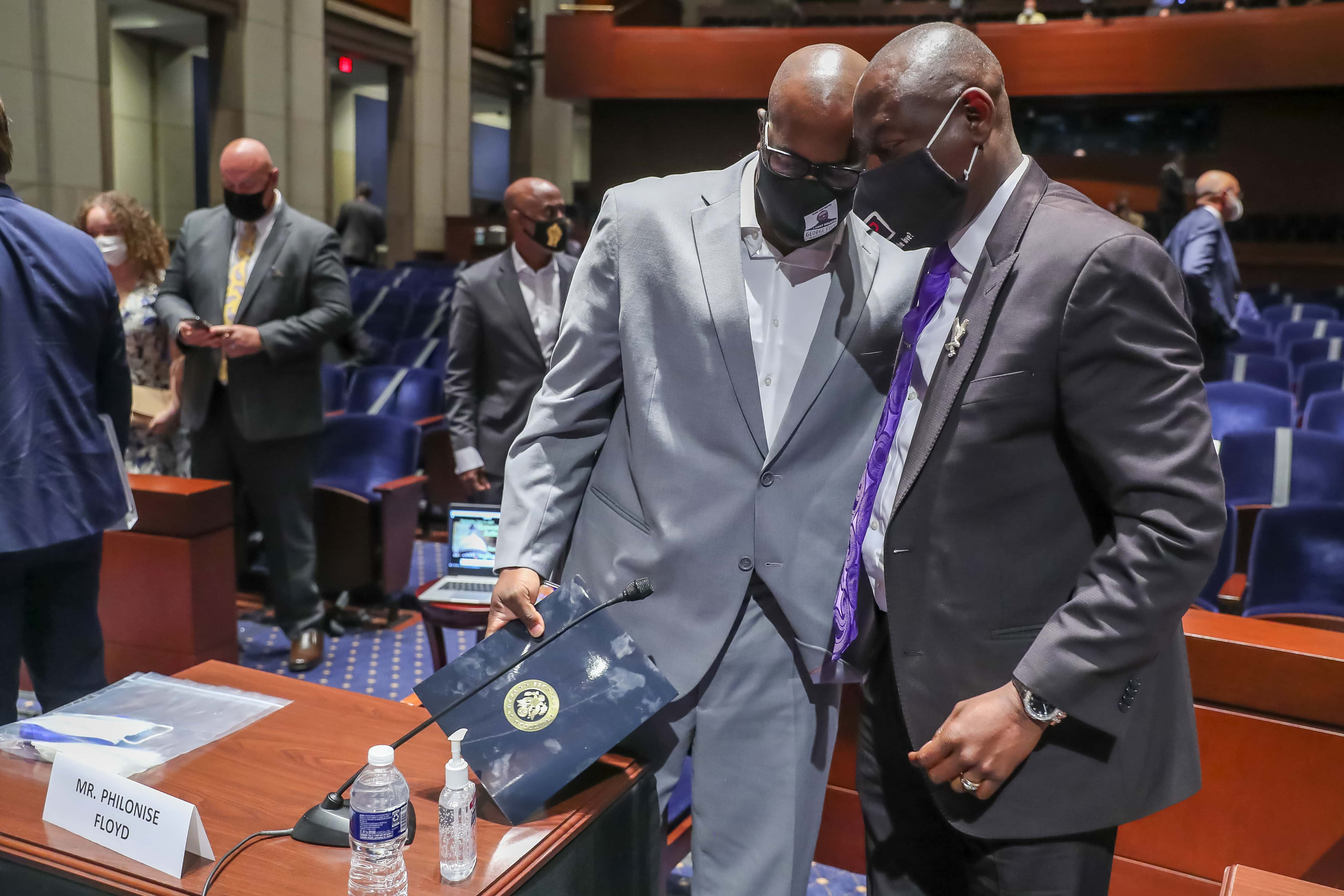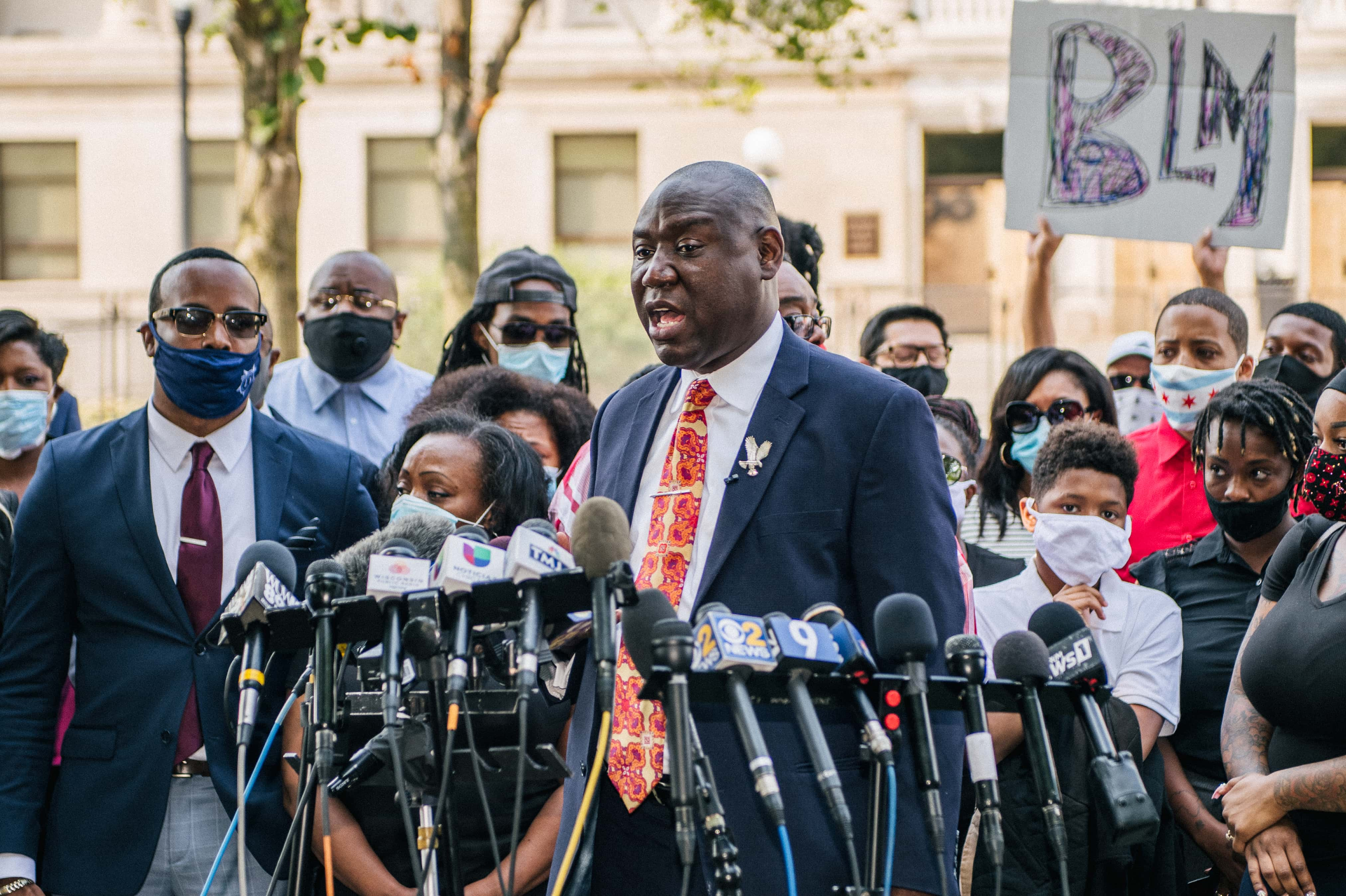Who is Benjamin Crump? Floyd family lawyer on 'landmark' Derek Chauvin trial has a history of cases against cops

Lawyer, activist, lobbyist, therapist, and even family member. These are just some of the many hats Benjamin Crump wears. At 50 years old, Crump could've looked the other way and chose to stay out of the spotlight, spending time with his family. Instead, he's decided to take the fight to cities, helping black families fight back against the injustice of racism. Crump's reputation precedes him - and for good reason.
He's represented the families of Trayvon Martin, Michael Brown, and George Floyd. He was also leading the charge for the people in Flint against former Governor Rick Snyder. Crump is also one of the lawyers responsible for getting Johnson & Johnson to pay $7.4 billion in damages. He's not done though, not by a long shot. As more black Americans face racial profiling, targeting, and police brutality, Crump is there on the front lines.
RELATED ARTICLES
Here's a look at how “the black Gloria Allred” managed to go from a small-time personal injury lawyer in Tallahassee to an important face of the civil rights battle in the 21st century.

Crump's small start
Crump was born in Lumberton, North Carolina. His mother worked two jobs - in a factory and at a hotel. The story of his father is a bit more of a mystery. Crump's biological father was reportedly a soldier stationed at Fort Bragg, but the man Crump calls his father was a math teacher in Fort Lauderdale. Early on, Crump was raised in a large extended family with nine siblings and step-siblings, uncles, aunts, and grandmother. "The statistics were against me the whole way of ever getting out of the projects, of ever becoming a lawyer," he told FSU Law.
How does one become interested in the law? It has to do with his early schooling. Reportedly, Crump's interest in civil rights comes from studying in a segregated school up to the fifth grade. "It was a situation to me, that I said, `Why do people on that side of the tracks have it so much better than people on our side of the tracks?'" he told Newsone. Luckily from Crump, he got a chance to defy the statistics. When he was in high school, his mother sent him to Fort Lauderdale to live with his father.
That opened doors for him, most importantly at Florida State University. He majored in criminal justice and English, on a scholarship. He said, "I was inspired by other graduates from the law school I met and made it possible for people like me to even have a chance to get a legal education." In 1996, he founded Parks Crump Attorneys with just three employees in Tallahassee. The goal? "We wanted to represent people from our community in situations where it’s the little guy against the system and we wanted to hold the system accountable."
That's exactly what he did. Right from the start, Crump made a name for himself helping predominantly African-Americans win settlements, huge amounts for clients injured in accidents. However, that was not good enough for Crump. "We’ve never been comfortable with just getting a monetary resolution. Daryl (his partner) and I have attempted to build a legal justice center—not just a law firm—predicated on helping people who historically have been denied justice. We’re trying to make a lot of wrongs right," he told FSU Law.
Together, those factors built Crump's reputation, drawing Gina Jones to him in 2006. Crump wasn't Jones' first choice, but desperate to get justice for her son Martin Lee Anderson, she turned to Crump for help. That was the case that really put Crump in the national spotlight.

High-profile cases
Crump discovered security footage camera showing white guards at the Panama City Boot Camp facility beating, kicking, and abusing Anderson. Within a year, Florida state settled with the family for $5 million and closed all the camps for good measure. It wasn't the victory he or the family were looking for, but it helped highlight the criminal justice system's flaws. In 2012, he became a national TV figure by representing Trayvon Martin's family, and in 2013 the family of Michael Brown. He wasn't just a lawyer, but an advocate for criminal justice. "Trayvon was Ben’s O.J. Simpson. It thrust him to national prominence,” John Morgan, founder of personal injury firm Morgan & Morgan told Tampa Bay.
What really made Crump stand out was not his ability to get the job done, but his ability to connect with the families he was representing. "He gives the very best legal advice he can, but he also lets the family weigh in. I felt I had someone I could really trust. He’s a family-oriented man, and he’s compassionate," Martin's mother Sybrina Fulton said. Those two wins gave Crump the push he needed to open his own firm - Ben Crump Law. From Tallahassee, the firm now has offices in California, Georgia, Illinois, Texas, and Washington DC.
With that, he has taken on the cases of Antonio Zambrano-Montes (2015), Zeke Upshaw (2018), Ahmaud Arbery (2020), and Christian Hall (2021). All these cases involve minorities who were killed by white people, and for whom justice seemed a distant dream. But justice hasn't always come. Crump has often been heaving criticized for taking on big cases, but failing to win a conviction. However, that anger seems to be quite misplaced. In the case of police violence, cases are tried by the state and not by attorneys-for-hire. Lawyers like Crump can only pursue civil cases, which is slightly easier to win.
Crump has fought over 200 cases of police violence, winning a cash settlement in all of them. As The New Yorker noted, "Crump could be the winningest attorney in the country who still reeks of failure.'

Working the media
Legal work aside, Crump is also significantly investing his time and effort in social justice. In 2018, he launched Brooklyn Media, a production company dedicated to documentaries on racism. He has also written 'Open Season: Legalized Genocide of Colored People', a part autobiography. Unlike other lawyers, he's learned the art of using the media to get public support. Nunn, a legal expert told Tampa Bay, "You always hear the comment, ‘I don’t want to try this case in the media.’ Well, if it’s a civil rights case, you have to. You can’t just have a good handle on the legal aspects of the case. You need a broader skill set that involves working the public and the media."
That's why Crump is in as many places as possible. He's often being interviewed on TV or for publications. He also writes frequently for Time magazine and appears in a variety of other places including a documentary. Crump knows how to play the game, and so far he appears to be playing it well.
That media-savvy nature also helps Crump drum up support from the public. It happened in the past with Ahmaud Arbery, and we are seeing something similar now with the case against Derek Chauvin. Initial charges of third-degree murder and second-degree manslaughter have been upped to a charge of second-degree murder. Crump is also calling for the charges to be upped even further, to first-degree murder. While the charges could help secure real justice for Floyd's family, it could come at a cost. Rachel Barkow, a vice-dean at the N.Y.U. School of Law told The New Yorker "It is absolutely the case that it’ll be harder to win on the second-degree-murder theory than it would be on third-degree."

She isn't the only one. Others are calling on Crump to stand down, through social media. But it hasn't deterred him yet. "If this was a black person who did it, nobody would be questioning whether it’s first-degree murder. So we’re saying charge him to the full extent of the law," he said. With the nation on edge, Crump's next steps will be vital not just for his reputation but for the many African-Americans suffering at the hands of the police.
Securing a conviction against Chauvin or any of the other cops could go a long way on the road to justice. It's not just a question of Crump's abilities though. In order for Crump to secure a conviction, Americans will have to accept that their police officers engage in violence, often race-based. Can he get them to see the truth? Millions hope so.










